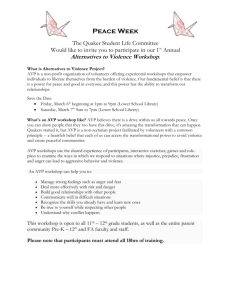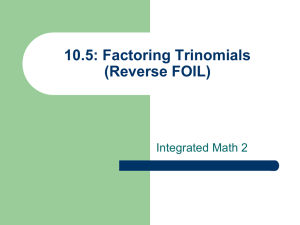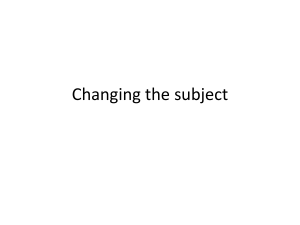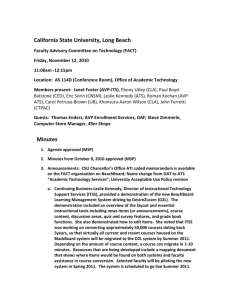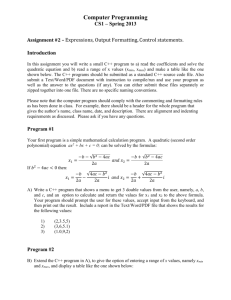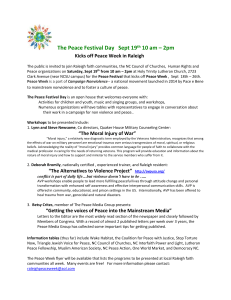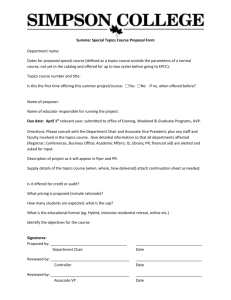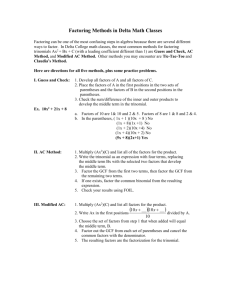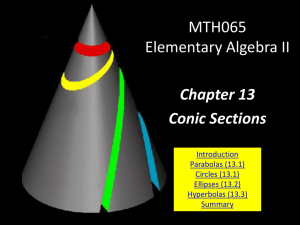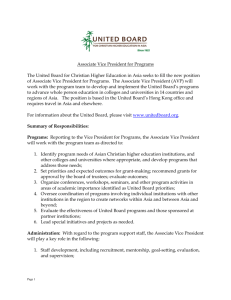AVP Brocure - Alternatives to Violence Project
advertisement
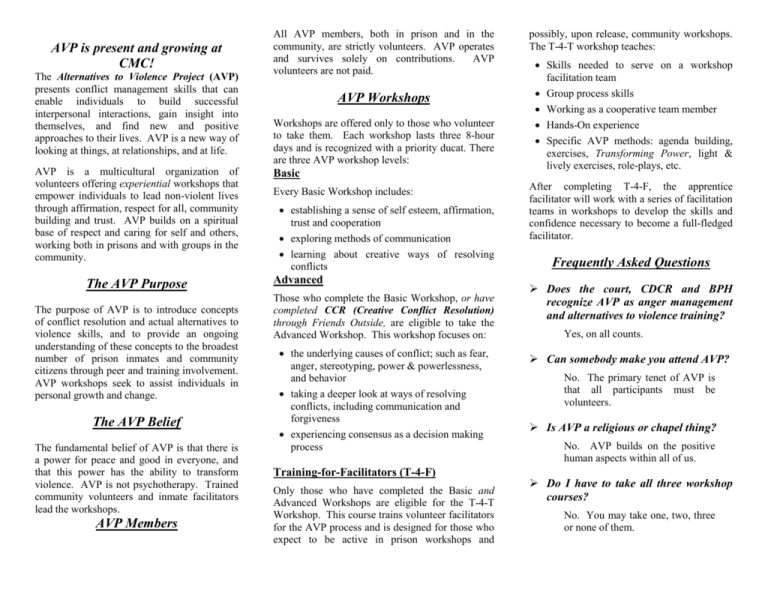
AVP is present and growing at CMC! The Alternatives to Violence Project (AVP) presents conflict management skills that can enable individuals to build successful interpersonal interactions, gain insight into themselves, and find new and positive approaches to their lives. AVP is a new way of looking at things, at relationships, and at life. AVP is a multicultural organization of volunteers offering experiential workshops that empower individuals to lead non-violent lives through affirmation, respect for all, community building and trust. AVP builds on a spiritual base of respect and caring for self and others, working both in prisons and with groups in the community. The AVP Purpose The purpose of AVP is to introduce concepts of conflict resolution and actual alternatives to violence skills, and to provide an ongoing understanding of these concepts to the broadest number of prison inmates and community citizens through peer and training involvement. AVP workshops seek to assist individuals in personal growth and change. The AVP Belief The fundamental belief of AVP is that there is a power for peace and good in everyone, and that this power has the ability to transform violence. AVP is not psychotherapy. Trained community volunteers and inmate facilitators lead the workshops. AVP Members All AVP members, both in prison and in the community, are strictly volunteers. AVP operates and survives solely on contributions. AVP volunteers are not paid. AVP Workshops Workshops are offered only to those who volunteer to take them. Each workshop lasts three 8-hour days and is recognized with a priority ducat. There are three AVP workshop levels: Basic Every Basic Workshop includes: establishing a sense of self esteem, affirmation, trust and cooperation exploring methods of communication learning about creative ways of resolving conflicts Advanced Those who complete the Basic Workshop, or have completed CCR (Creative Conflict Resolution) through Friends Outside, are eligible to take the Advanced Workshop. This workshop focuses on: the underlying causes of conflict; such as fear, anger, stereotyping, power & powerlessness, and behavior taking a deeper look at ways of resolving conflicts, including communication and forgiveness experiencing consensus as a decision making process Training-for-Facilitators (T-4-F) Only those who have completed the Basic and Advanced Workshops are eligible for the T-4-T Workshop. This course trains volunteer facilitators for the AVP process and is designed for those who expect to be active in prison workshops and possibly, upon release, community workshops. The T-4-T workshop teaches: Skills needed to serve on a workshop facilitation team Group process skills Working as a cooperative team member Hands-On experience Specific AVP methods: agenda building, exercises, Transforming Power, light & lively exercises, role-plays, etc. After completing T-4-F, the apprentice facilitator will work with a series of facilitation teams in workshops to develop the skills and confidence necessary to become a full-fledged facilitator. Frequently Asked Questions Does the court, CDCR and BPH recognize AVP as anger management and alternatives to violence training? Yes, on all counts. Can somebody make you attend AVP? No. The primary tenet of AVP is that all participants must be volunteers. Is AVP a religious or chapel thing? No. AVP builds on the positive human aspects within all of us. Do I have to take all three workshop courses? No. You may take one, two, three or none of them. What do I get for taking AVP? After fully completing a workshop, the participant will receive a completion certificate and CDC128B chrono for each individual workshop. Are inmate facilitators paid? No. All facilitators, in prison and from the community, are unpaid volunteers. How do I sign up for AVP? You must submit a CDC-153 REQUEST FOR INTERVIEW and ask to be placed on the AVP waiting list. There is no sign-up sheet. Will I be in the very next workshop? List placement is based on the ‘firstcome first-served’ principle. You will be ducated for an AVP workshop as your name works up the waiting list. Alternatives to Violence Project/ California How long has AVP been around? AVP began in 1975 within the New York State Prison system. It was introduced to California in 1990; originally at Richard J. Donovan Correctional Facility in San Diego. To Sign Up For AVP Submit your completed CDC-153 REQUEST FOR INTERVIEW form requesting to be placed on the AVP waiting list to: Rabbi Moskowitz Interfaith Chapel Is AVP a bunch of lectures and videos? No. AVP is an “experiential workshop” where everyone participates in hands-on exercises and discussions. How big are the AVP classes? Each AVP workshop allows a maximum of 20 participants (not including facilitators). If I took AVP at another prison, do I have to retake everything here? No, your previous training is recognized. When you sign up for AVP be sure to include copies of the certificates and/or chronos you earned. Alternatives to Violence Project / California is registered as a non-profit 501(c)(3) educational organization. All contributions are tax deductible For community information call 1-800-905-6765, or visit the web site at www.AVPCalifornia.org. AVP/California P.O. Box 3294 Santa Barbara, CA 93130 At California Men’s Colony A V P California Department of Corrections & Rehabilitation
